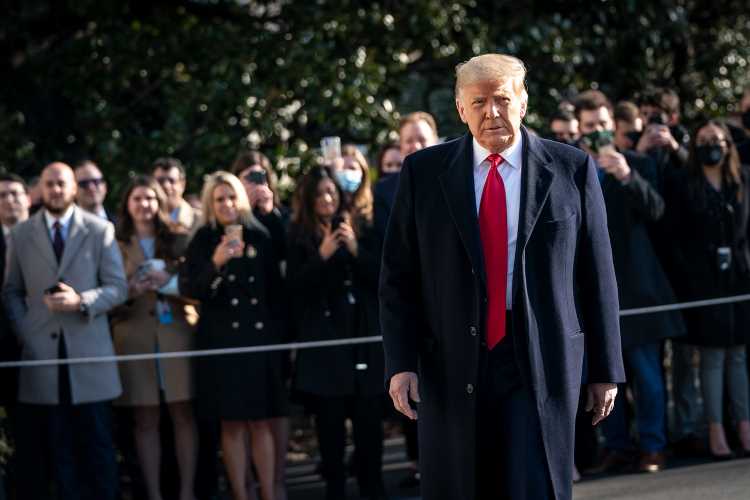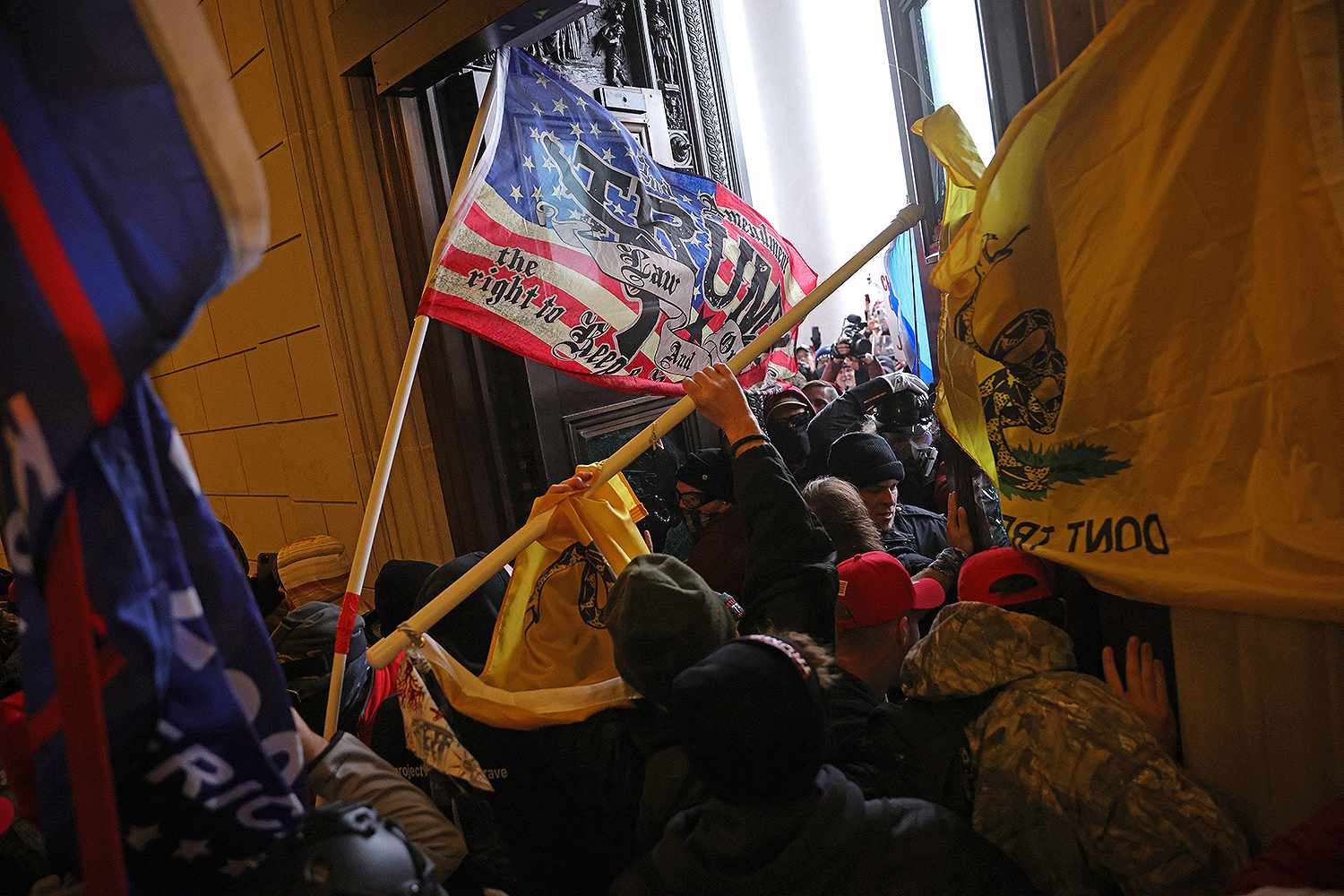Not hours after the House of Representatives charged him with inciting an insurrection against the government, President Donald Trump released a speech reversing his tone about a crisis that has already led to his historic second impeachment and may soon overshadow his post-White House life.
In the prerecorded remarks, posted late Wednesday afternoon, he "unequivocally condemn[ed]" last week's deadly riot at the Capitol — a familiar phrase for a president who has often had to clarify his stance on controversy after initial reluctance.
He went on to call for cooler heads and cooler words and a sense of national unity to prevail.
But in keeping with the bizarrely blinkered and unusually decorous tone of the five-minute speech, President Trump, 74, did not mention successor Joe Biden (whom he had repeatedly, and without evidence, accused of stealing the election) or the impeachment proceedings.
And rather than attack Biden or the Democratic Party or the electoral process that saw him defeated in November, as he has done the last two months, Trump spoke largely in generalities about healing and reconciliation — tonal whiplash for a politician whose career was built on name-calling and provocation.
He made no reference to his previous statements about the Jan. 6 rioters, whom he had encouraged to march on the Capitol following a rally near the White House and whom he had praised as "very special" after they descended into mob violence, warning in the immediate aftermath that "these are the things and events that happen when … great patriots … have been badly & unfairly treated for so long."
In his speech on Wednesday, he also did not reference any of the five people who died in the rioting, including Capitol police officer Brian Sicknick, fatally beaten by the mob.
"My fellow Americans, I want to speak to you tonight about the troubling events of the past week," he began his speech. "As I have said, the incursion of the U.S. Capitol struck at the very heart of our Republic. It angered and appalled millions of Americans across the political spectrum."
"Violence and vandalism have absolutely no place in our country and no place in our movement," Trump said. "'Making America great again' has always been about defending the rule of law, supporting the men and women of law enforcement and upholding our nation's most sacred traditions and values. Mob violence goes against everything I believe in and everything our movement stands for."
Acknowledging that federal authorities are aware of possible future gatherings of armed protesters and the potential for more violence, Trump said that "no true supporter of mine could ever endorse political violence. No true supporter of mine could ever disrespect law enforcement or our great American flag. No true supporter of mine could ever threaten or harass their fellow Americans. If you do anything of these things, you are not supporting our movement, you're attacking it and you're attacking our country. We cannot tolerate it."
Trump then pivoted to talk of a year of "political violence" rather than the reality of last week's events, in which throngs of his supporters overwhelmed police at the Capitol during a joint session of Congress meant to ratify Biden's victory. Instead those same lawmakers were forced to flee to secure locations or barricade themselves in their offices after the mob breached the building, attacking officers and ransacking the center of the country's democracy. One protester was killed by police and three other people died, authorities have said.
Referring to next week's inauguration of President-elect Biden, Trump said Wednesday that he had "directed federal agencies to use all necessary resources to maintain order. In Washington, D.C., we are bringing in thousands of National Guard members to secure the city and ensure that a transition can occur safely and without incident."
"Like all of you, I was shocked and deeply saddened by the calamity at the Capitol last week," Trump said, in a characteristic refrain from his speech. "I want to thank the hundreds of millions of incredible American citizens who have responded to this moment with calm, moderation and grace. We will get through this challenge just like we always do."
"Today I am calling on all Americans to overcome the passions of the moment and join together as one American people," the president said. "Let us choose to move forward united, for the good of our families, our communities and our country."
Trump devoted the final section of his speech to "the unprecedented assault on free speech we have seen in recent days," a barely veiled reference to Facebook, Twitter, YouTube and other digital media companies who booted him from their platforms — temporarily or indefinitely — in connection with last week's violence.
(Indeed, his pre-taped speech was released by the White House's official Twitter after his personal account was suspended.)
As with elsewhere in his speech, Trump spoke of common ground and shared values rather than the "rancor" that his critics would say is epitomized by his very tweets — regularly mocking other lawmakers, spreading conspiracy theories and assailing those who displease him in starkly personal terms.
"What is needed now is for us to listen to one another, not to silence one another," Trump said Wednesday. "All of us can choose by our actions to rise above the rancor and find common ground and shared purpose. We must focus on advancing the interest of the whole nation, delivering the miracle vaccines, defeating the pandemic, rebuilding the economy, protecting our national security and upholding the rule of law."
His impeachment loomed just off-camera: The House's Democratic majority was joined by 10 Republicans — the most ever — in voting to impeach him for "incitement of insurrection," with a Senate trial expected to begin after the leaves office on Jan. 20.
The Senate could also vote to bar Trump from ever holding federal office again.
"Much more will become clear in coming days and weeks, but what we know now is enough," Rep. Liz Cheney, the chair of the House Republican Conference and the No. 3 Republican in the House, said in a statement this week announcing she would vote to impeach. "The President of the United States summoned this mob, assembled the mob, and lit the flame of this attack. Everything that followed was his doing. None of this would have happened without the President."
In her own speech on Wednesday, House Speaker Nancy Pelosi said that Trump was "a clear and present danger to the nation we all love."
He "must be impeached," she said, "and I believe the president must be convicted by the Senate, a constitutional remedy that will ensure that the republic will be safe from this man, who is so resolutely determined to tear down the things that we hold dear, and that hold us together."
Source: Read Full Article


